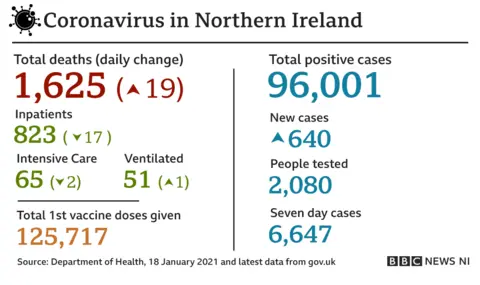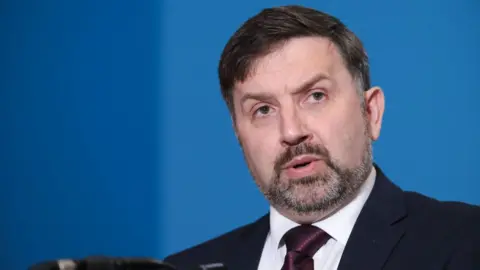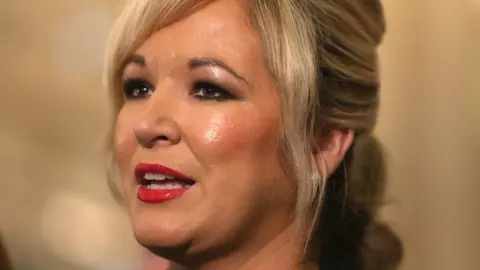Covid-19: 'Toughest week yet' of pandemic for NI hospitals
 PA Media
PA MediaMedical staff are expected to "face pressures unlike any other they have faced before" as NI approaches its toughest week so far in the pandemic.
The British Medical Association has said while its doctors are "coping", many feel they are unable to give care to the "standard they would want".
The peak in intensive care is predicted to happen next weekend.
The head of the BMA in NI, Dr Tom Black has been critical of the way this wave of the pandemic has been managed.
He said: "Staff will do their best in a very difficult situation, where many decisions in this pandemic were made too late."
Annual leave cancelled
While it is expected the number of hospital admissions will peak sometime over the next eight to 10 days, the number requiring intensive care treatment is likely to continue increasing for at least another fortnight.
Dr Black said he was concerned for both patients and staff.
He said: "It is likely that over the next few weeks doctors will be asked to work in a new location or provide support to areas that are already overstretched.
"Many have already had planned annual leave cancelled."
There were a further 19 virus-related deaths and 640 more Covid-19 cases reported in Northern Ireland on Monday.
The latest figures from the Department of Health bring the total number of deaths to 1,625, while 96,001 people have tested positive for the virus since the pandemic began.

Some 65 patients are in ICU, down two from the last report, and 51 patients are being ventilated.
Since the vaccine rollout began in NI, 146,733 people have been vaccinated, according to the Department of Health.
Of that number, 125,717 were first doses and 21,016 were second jabs.
A total of 31,393 people from the over-80 age group have been vaccinated.
Earlier the BMA told BBC News NI that more than 90,000 doses the Oxford-AstraZeneca vaccine had arrived in Northern Ireland but the Department of Health has said it is anticipated separate deliveries will arrive by this weekend.
Dr Black said many staff members had reported feeling "exhausted and demoralised" and he warned that when it came to reviewing how the pandemic was handled "this phase will stand out as one where we could have planned better".
Health Minister Robin Swann said the next seven days is "when we will see that real intense pressure coming on our inpatients and intensive care units".
"Our worst case scenario has modelling up to 1,200 inpatients - and that's a serious pressure that comes on our system," he told Radio Ulster's Evening Extra programme.
 Kelvin Boyes/Press Eye
Kelvin Boyes/Press Eye"We can go up into nearly 200 ICU capacity but that comes at a stretch, that comes with putting our staff under severe pressure in ICU units.
"It also comes by having to shift the ICU specialist nurse from a ratio of one-to-one to a ratio of one-to-two or even one-to-three in extreme pressures.
"That's not something we want to do," he added.
Major incident avoided
The past week saw hospitals across Northern Ireland coming together in order to cope with the strain.
On 10 January, the Southern Health Trust was on the cusp of declaring a major incident amid the mounting pressures across the health service.
That was avoided as many off-duty staff answered a call to come into work and the health trusts pulled together to provide a regional response to the crisis.
Patients were diverted to those hospitals which could take them and where infrastructure could cope with supplying additional oxygen to the very ill.
Over the weekend of 9/10 January the Southern Health Trust - the smallest of the health trusts - was dealing with the highest number of patients who required oxygen.
In the past week the Northern and Southern Health Trusts have seen the highest number of patients.
That reflects the high rate of community transmission in some areas those trusts cover.
Dublin-Stormont data sharing meeting
Meanwhile, no resolution has been reached between Stormont leaders and the Irish Government over the sharing of passenger data.
Last week, First Minister Arlene Foster and Deputy First Minister Michelle O'Neill criticised Dublin for failing to share information on travellers arriving there during the pandemic.
 Press Association
Press AssociationFirst Minister Arlene Foster said repeated efforts to access data on passenger locator forms filled out by people arriving in the Republic of Ireland had failed.
Mrs Foster and Ms O'Neill indicated on Thursday that they planned to raise the matter directly with Taoiseach (Irish prime minsiter) Micheál Martin.
Ms O'Neill told the Northern Ireland Assembly on Monday that no resolution has been found yet.
She told MLAs the issue had been raised "on every occasion we have had the opportunity" and that it was "regrettable" that the issue had not been resolved.
The travel issue will be discussed at a meeting on Wednesday involving the first minister, the deputy first minister, Irish Foreign Affairs Minister Simon Coveney and NI Secretary of State Brandon Lewis.
"I hope that perhaps Wednesday's meeting will allow some opportunity for there to be a way forward," the deputy first minister added.
It was announced on Sunday that all travellers who have returned from Portugal or transited through 16 South American countries in the past 14 days will have to - along with their household - self-isolate for 10 days upon return to Northern Ireland.
This includes travellers who entered these countries en route to another destination. All travellers returning home from South America are advised to be tested, whether or not they have symptoms.
From Thursday, all international travellers will be required to present a negative Covid-19 test result before arriving in Northern Ireland.
This rule comes into effect in England, Scotland and Wales on Monday.
Republic of Ireland
On Monday, the Department of Health in the Republic of Ireland reported eight more coronavirus-related deaths.
It brings its death toll to 2,616.
The department said 2,121 new cases of the virus had been reported, with a cumulative total of 174,843 infections.
It said that as of 14:00 local time on Monday, 1,975 Covid-19 patients are in hospital, of which 200 are in ICU (intensive care units).
Irish Chief Medical Officer, Dr Tony Holohan, said: "This third wave of the pandemic has seen higher level of hospitalisations across all age groups.
"There are now more sick people in hospital than any time in the course of this pandemic".
